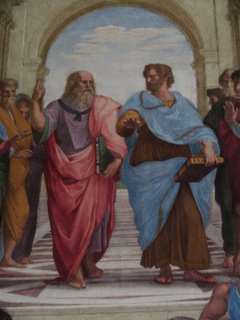
I AM NOT accustomed to ranting on my blog. In fact, this may be entirely unprecedented. That being said, haven't the English heard--Plato (the bugger on the left picking an imaginary nose in this image) HATED POETS! He thought they spun beautiful lies...they were dangerous. In fact, all writing was dangerous. It risked that the undereducated silver or bronze classes of "commoners" might acquire the ability to read (unlikely in itself) and misinterpreting texts! Clearly, only philosophers should pass along knowledge...you know, through pedophilic masculine homosexual relations. No one else is fit to. Speech is masculine and virtuous. Written word is feminine, given to erroneousness or subjectivity...according to Plato. How icky. I think he just couldn't deal with the female body's ability to procreate physically...he was intimidated, afraid of the feminine!
This accounted for, what in the hell am I doing reading Plato in all of my ENGLISH LITERATURE classes? What about Descartes? Have the English forgotten that he is French? Duh...that's why we say "De-cart" instead of "Des-cart-es"...
For the life of the queen, they invented the Bard, not to mention the Beatles, or Lord Byron, Dickens, Bronte, Blake, Austen, Tolkien...and the list goes on for days.
That said, what is gained by a philosophical (albeit one restricted to WESTERN philosophy) approach to literature? Perhaps it is to remind ourselves that what we are looking for in the act of literary creation is not a pleasing aesthetic experience, in and of itself...but a stab at the virtuous, the truthful, the meaningful. To create meaning out of even the most mundane...it is what poets do, but also what lovers do. This madness, feverishness, anarchic creativity is only as such in a communicable order. Language is order. Reason, philosophy...they yield and create the stuff of mythology and poetry. This is not to say that great philosophical texts are to be used by students of literature as fodder for better writing, but rather that they can be engaged. They must be engaged.
This particular philosophy of teaching can be perceived as a liberal arts education (of which i am both a huge fan and a product) to the nth power. Knowledge is not compartmentalized in reality, the way it often is in school systems, for the sake of practicality or economics... Rather, Plato and his comrades had it right--to be a scholar, one must be inquisitive about everything. Be a poet, and also a mathematician, and also a theoretician, a chemist, a musician, a politician, a playwright...and you will be a scholar in the fullest sense.
...Plato was wrong about poets though.
No comments:
Post a Comment